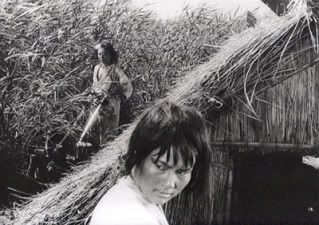Onibaba (Shindô, 1964)

The pulsing drums underneath the opening credits draw us in immediately. These are quickly followed by the distinct intensity of the two lead performers. Two women, one a young widow whose husband’s life has been claimed in the war and the other her mother-in-law, make their home in a marshy area covered in reeds that severely limit visibility for the unfortunate soldiers that stumble in. They venture in seeking a hiding place from pursuers and find themselves instead within a trap policed by merciless scavengers. Quickly and efficiently, their armor is stripped and their unclothed bodies are unceremoniously dropped into a giant hole. The pulsing drums return. Not surprisingly, it will not be the last time we hear them.
Kaneto Shindo’s Onibaba is a film ahead of its time, aggressive in its sexuality and its ferocity. Within a matter of minutes, Shindo gives us a palpable sense of place, time and the central characters. We know that these women are hardened, desperate and dangerous. We know that male sexuality and dominance is sharply threatened by these women with their loose-fitting kimonos and the dark vaginal opening that is used to dispose of their corpses. We know that the hole will figure prominently in the way the plot unfolds – but who end up down there? And how? Shindo not only immerses us in the geography of his setting, guiding us with his camera through the blowing reeds, but offers us a meticulous sense of atmosphere. It’s hard to think of Onibaba without thinking of the two women, sleeping uncovered on the floor, occasionally topless. There is a pervasive sense of heat in this film – and unpleasant, oppressive kind of heat that goes beyond the earthly and suggests something downright hellish.
Despite the detail in establishing the period, the narrative that unfolds is as simple as a fairy tale. And yet, it is all the more potent in its impact due to its use of easily identifiable types. When another young man enters the picture and takes up residence a short way away from the women’s hut, it is not long before she is escaping at night to enjoy his company. As you may suspect, her wandering is not appreciated by the mother of her former husband. Do I dare reveal to those of you who have not seen the film the way in which she attempts to prevent their affair from continuing? I think I shall leave it to be discovered as I did, because it is a sheer thrill, particularly in the way it is executed. The world Shindo creates and the tale he tells are both absolute joys, filled with an honesty towards sex and warfare and a conclusion that is both provocative and chilling. It is a film that grasps us by the throat and sears itself into our memories.
[****]

